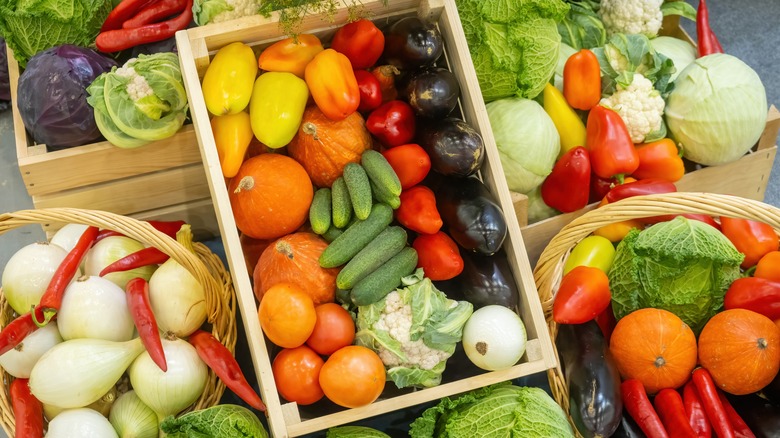What Happens To Expired Food At The Grocery Store?
Food waste is a problem, especially in America — a 2024 report estimates that the U.S. discards 120 billion pounds of food every year (per RTS). But many folks are doing their part, including large grocery store chains like Trader Joe's, Whole Foods, Costco, and Aldi.
Trader Joe's is leading the charge, stating that "we are proud of our long-standing commitment to donate 100% of products that go unsold but remain fit to be enjoyed by communities seeking food assistance." Through its Neighborhood Shares program, it provided $469 million worth of food to help those in need in 2023. Trader Joe's also runs a tight inventory system, conducting daily expired item pulls, offering discounts on products nearing their sell-by dates, and composting any food that has spoiled in-store.
Whole Foods, in partnership with Amazon, is "pledging to cut our food waste in half by 2030" through upcycling, donating, and finding new solutions to tackle the issue (per Whole Foods Market). Upcycling means repurposing food that is still perfectly good but may have minor visual imperfections into products like smoothies, soups, or baked goods. In 2022, Whole Foods donated $30 million worth of meals through its food recovery partners. It also launched the Nourishing Our Neighborhoods program, which donates refrigerated trucks to deliver food across the country.
Costco is also paving the way with its unsold produce policy and Sustainability Commitment, which aims to divert 80% of food waste from landfills (it reached 78.3% in 2022, per Costco). Costco collaborates with Feeding America, World Vision, and local food banks. Meanwhile, Aldi has committed to divert 90% of its waste from landfills by 2025.
Some companies have become food waste champions
The United States Department of Agriculture (USDA) and the U.S. Environmental Protection Agency (EPA) are enlisting companies to reduce their waste by 50% by 2030. Since 2016, the U.S. Food Loss and Waste 2030 Champions program has recognized 45 champions. To join this effort and become a champion, organizations must publicly declare this goal, commit to it (through prevention, recovery, and recycling), submit a plan, and provide progress reports. Among the champions are Aldi and Amazon, as well as Hilton, Aramark, Starbucks, Walmart, PepsiCo, Wegmans, and Wendy's.
Some companies are approaching this cause from other angles. Stop & Shop, a champion, converts non-donatable food into electricity. Misfits Market delivers recovered produce at a discounted rate right to your door, and Mill has revolutionized home composting with a device that dehydrates food scraps and converts them into nourishing chicken feed. Although this fight is far from over, plenty of companies are reducing food waste and raising the bar — and you can do your part at home by checking out which food scraps you shouldn't be throwing out.


